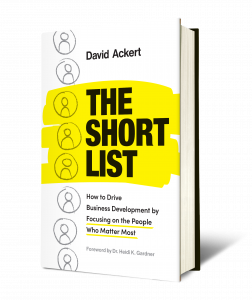There’s never a shortage of work to do when you own or manage a book of business. With an endless list of tasks, business developers have to decide which items to cross off today – and which will have to wait until another time. It’s endlessly fascinating work on the upside: no two days look the same, and your book of business is growing. On the downside, you constantly have to choose between client service and client development, and you rarely have the time you need to do both well.
Let’s take a moment to zoom out of the daily whirlwind for a moment. I think we can agree that incorporating habits for consistency drives overall success. You may not be able to get your entire task list completed every day, but you should make sure that you are building the habits of a service-oriented professional and a good business developer. There are many habits you can cultivate, but let’s start with what we call the First Four.
The First Four
- Plan Ahead: Most people have an annual habit of setting goals for the year (or at least setting a few half-hearted resolutions). If this isn’t a habit for you, or if you think yours could benefit from improvement, try our strengths-based approach to goal setting.
- Set your Weekly Targets: What are your business development goals this week (you did remember to set some, right?) Do you intend to follow up with three people in your network? Revitalize a dormant referral source? Make a call to a well-connected friend and ask for an introduction? Imagine how successful your year would be with a standing Monday habit of establishing a business development goal.
- Check your Numbers: Here’s a common habit faux-pas: setting a goal, implementing it, but failing to check progress throughout the year. How do you know if the actions you are taking are working unless you consistently measure your advancement? Make a regular habit of monitoring your performance, either through a dedicated dashboard or a paper checklist. The methodology is less important than the behavior itself.
- Listen to Your Clients: You definitely know when you’ve met your deadlines, and you mostly know when you’ve satisfied your clients’ expectations (i.e., they don’t overtly complain), but are you listening for the opportunities to exceed their expectations? After all, you want them to rave about you, bring you in for more work, and think about you as their go-to provider. So, dedicate some time out of your day to chat with your clients about their general experiences. A more relaxed conversation will provide a forum for them to volunteer frustrations that you may be able to solve directly or be able to solve indirectly through your network. They may also hint at strengths you can build on and weaknesses to address if you expect to grow their account.
Enabling your Habits
Depending on the context, enablement can have a negative connotation, but if you are enabling your own good habits, you are definitely on a healthy path. Business development is not easy. It requires commitment, discipline and courage. Without the people and tools to encourage you, your chances of success are lower, and your journey is harder. Technology is making sales enablement easier, with tools that help you organize your clients and other contacts, teach best practices through e-learning, provide smart suggestions through AI, and measure your success with intuitive sales enablement dashboards. Set your firm up for success by making these resources available to yourself and your team.







